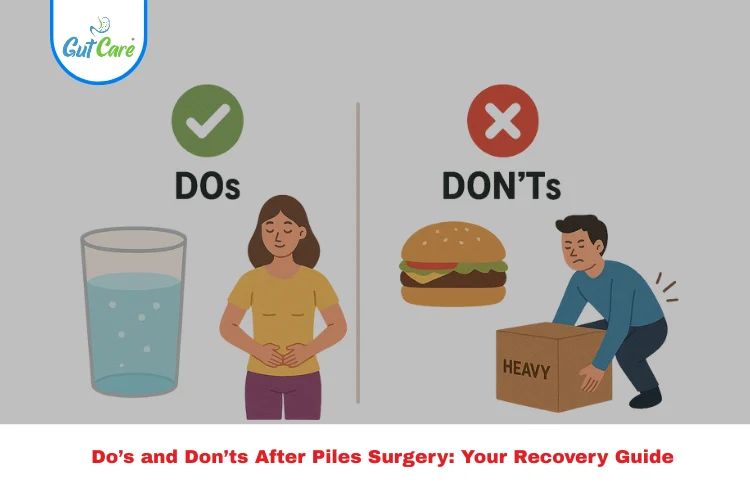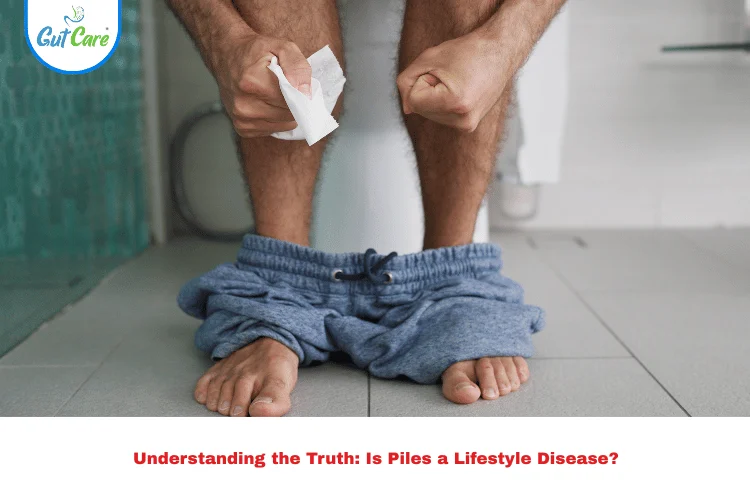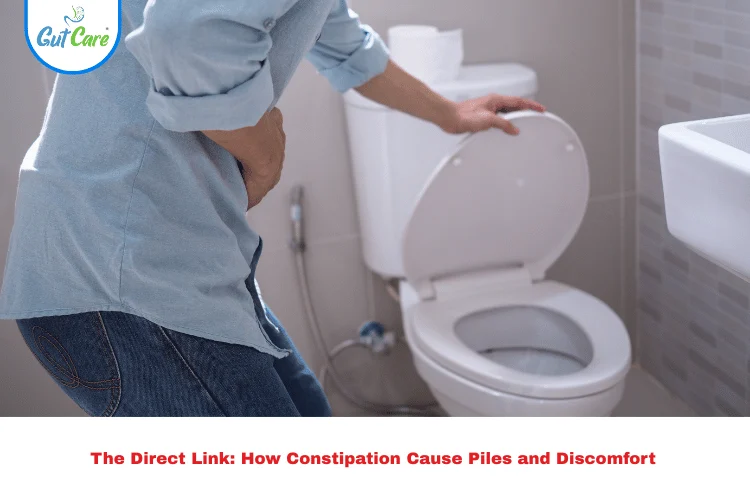Recovering after piles surgery requires thoughtful care and proper post-operative routines. At Gutcare Clinics, Bangalore’s trusted center for gastrointestinal and colorectal treatment, patients receive expert guidance from Dr Yuvraj Singh Gehlot, a leading piles specialist. Whether you’ve had a conventional hemorrhoidectomy or a laser piles procedure, following the right do’s and don’ts is key to healing faster, avoiding complications, and getting back to daily life comfortably. This guide outlines the best practices to follow and pitfalls to avoid.
Why Aftercare Matters
Surgery removes the physical issue of hemorrhoids, but the recovery period plays a vital role in ensuring long-term success. Inadequate aftercare can lead to:
- Infection or delayed wound healing
- Constipation or re-bleeding
- Discomfort or recurrence of symptoms
Being informed and consistent with care after piles surgery significantly enhances your recovery and improves quality of life.
Do’s After Piles Surgery
1. Follow Your Doctor’s Instructions
Each patient’s recovery may differ depending on the severity of the piles, type of surgery, and overall health. Always follow the specific post-operative instructions provided by your surgeon. Dr Yuvraj Singh Gehlot, at Gutcare Clinics, provides personalized care plans that include:
- Medication dosage and timing
- Activity restrictions
- Wound care steps
- Follow-up schedules
Ignoring these can delay healing and lead to complications.
2. Eat a High-Fiber Diet
Fiber adds bulk to the stool and makes bowel movements easier, helping avoid strain on the surgical site.
Recommended high-fiber foods include:
- Fruits like papaya, apples (with skin), and oranges
- Leafy vegetables such as spinach and fenugreek
- Whole grains like oats and brown rice
- Legumes including lentils and kidney beans
Fiber supplements such as isabgol (psyllium husk) can also be used if needed. Always consult your doctor before starting any supplement after piles surgery.
3. Drink Plenty of Water
Hydration is essential to soften stools and support digestion. Drink at least 8 to 10 glasses of water daily unless otherwise advised. Fluids like herbal teas, clear soups, and coconut water can also aid in hydration.
4. Take Sitz Baths
Sitz baths help relieve pain and reduce inflammation in the rectal area.
Instructions for a sitz bath:
- Fill a clean tub or basin with lukewarm water
- Sit in it for 10 to 15 minutes
- Repeat 2 to 3 times a day, especially after bowel movements
- Gently pat the area dry with a soft towel
This practice keeps the area clean, promotes healing, and minimizes post-surgical irritation.
5. Take Medications as Prescribed
Pain relievers, stool softeners, and antibiotics are commonly prescribed after piles surgery. Never self-medicate or skip doses without consulting your doctor. This ensures pain control and helps prevent infections.
6. Resume Light Physical Activity
While rest is essential, complete bed rest is not recommended. Begin with short walks as advised. Walking stimulates blood flow and helps prevent post-operative complications like blood clots. Avoid:
- Heavy lifting
- Cycling or squatting
- Intense exercise routines
Don’ts After Piles Surgery
1. Do Not Strain During Bowel Movements
Straining puts unnecessary pressure on the surgical site, increasing the risk of bleeding or recurrence. To avoid this:
- Don’t delay when you feel the urge
- Keep your stools soft through fiber and fluids
- Use prescribed laxatives or stool softeners if necessary
2. Avoid Spicy, Greasy, and Junk Foods
Spicy or oily foods can irritate the digestive tract and cause hard stools or diarrhea. Avoid:
- Fried snacks
- Pickles and chutneys
- Carbonated beverages
- Processed or packaged foods
Stick to a simple, home-cooked diet that supports easy digestion.
3. Don’t Sit for Long Periods
Sitting for long hours can increase pressure on the rectal area and delay healing. Use a donut cushion or sit on soft surfaces. Stand up and stretch every 30 minutes if you have a desk job.
4. Avoid Using Rough Toilet Paper
After surgery, the anal area is sensitive and vulnerable. Harsh wiping can irritate or injure the area. Instead:
- Use a handheld bidet with lukewarm water
- Gently pat dry with a soft towel or tissue
- Use moist, alcohol-free wipes if necessary
5. Don’t Ignore Warning Signs
If you experience any of the following, contact your piles specialist immediately:
- High fever or chills
- Excessive or sudden bleeding
- Severe or worsening pain
- Foul-smelling discharge
These could indicate a post-surgical complication that needs prompt medical attention.
Importance of Professional Follow-Up
Recovery doesn’t end when you leave the hospital. Regular follow-ups with a specialist are essential to monitor your healing, adjust medications, and prevent recurrence.
At Gutcare Clinics, Dr Yuvraj Singh Gehlot provides end-to-end care—from diagnosis to surgery and post-operative recovery. His expertise in laser piles surgery ensures faster healing, minimal discomfort, and a low recurrence rate.
Book your consultation with Dr Yuvraj Singh Gehlot
Why Choose Gutcare Clinics for Piles Surgery?
Gutcare Clinics, based in Bangalore, is a leading center for advanced anorectal care. Here’s what sets us apart:
- Experienced medical team led by Dr Yuvraj Singh Gehlot
- Advanced laser piles surgery with quicker recovery times
- Minimal pain and low risk of complications
- Comprehensive aftercare support
- Over 10,000 satisfied patients
Summary
Healing after piles surgery requires discipline, patience, and the right medical guidance. Key takeaways:
- Eat fiber-rich, non-spicy food
- Drink plenty of water
- Take sitz baths regularly
- Use medications responsibly
- Avoid long sitting hours and straining
Consult a qualified piles specialist like Dr Yuvraj Singh Gehlot at Gutcare Clinics for individualized care. With the right approach, your recovery can be smooth, safe, and lasting.
Frequently Asked Questions (FAQs)
1. What is the quickest way to heal after piles surgery?
A blend of fiber-rich diet, good hydration, sitz baths, and some light exercise can hasten recovery. Also, routine follow-ups with a piles specialist helps ensure there are no concerns.
2. Is it normal to feel pain after piles surgery?
Yes, it is normal to have mild to moderate pain in the first week after piles surgery. Pain should start to diminish gradually with medications and sitz baths. If ever the pain becomes even worse, however, consult your doctor.
3. When can I go back to work after piles surgery?
This depends on the type of procedure, but generally light desk work can resume within a week. Avoid strenuous activities or heavy lifting until your healthcare provider gives clear advice.
4. What should I avoid eating after piles surgery?
Avoid spicy, oily, and processed foods, which can cause your stools to be hard and/or may irritate the area or cause diarrhea.
5. Why is Gutcare Clinics the best hospital for piles treatment in Bangalore?
Gutcare Clinics offers modern, minimally invasive treatments, competent post-operative care from professionals with many years of experience, and surgery performed by Dr Yuvraj Singh Gehlot, one of the most trustworthy piles specialists in Bangalore. It is no wonder Gutcare Clinics has a fast recovery and high patient satisfaction rate.




